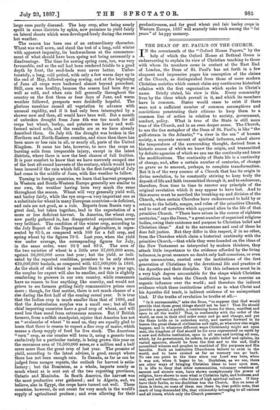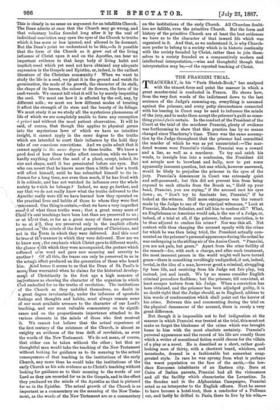THE DEAN OF ST. PAUL'S ON THE CHURCH.
IN the seventeenth of the "Oxford House Papers," by the help of which the Oxford House at Bethnal Green is endeavouring to explain its view of Christian teaching to those with whom its members come in contact at the East End of London, the Dean of St. Paul's has set forth in a few eloquent and impressive pages his conception of the claims of the Church, as distinguished from those of more modern Christian societies which cannot claim any continuous historical relation with the first organisation which spoke in Christ's name. Briefly stated, his view is this. Every community lives by the ideas which prevail in it, and which its members have in common. States would cease to exist if there were not a sufficient number of common assumptions and convictions penetrating their citizens to keep them to a common line of action in relation to society, government, conduct, policy. What is true of the State is still more true of the Church, and in an even deeper sense. The Church, to use the fine metaphor of the Dean of St. Paul's, is like "the gulf-stream in the Atlantic," "a river in the sea " of human society, a separate current of spiritual influence, raised above the temperature of the surrounding thought, derived from a historic source of which we know the origin, and transmitted by definite agencies of which we can see the continuity and trace the modifications. The continuity of State life is a continuity of change, and, after a certain number of centuries, of change so grave as to amount, perhaps, to complete transformation. But it is of the very essence of a Church that has its origin in divine revelation, to be constantly striving to keep traly the deposit of life and faith transmitted through it, and to endeavour, therefore, from time to time to recover any principle of the original revelation which it may appear to have lost. And to this source must be ascribed the breaking-up and division of the Church, when certain Churches have endeavoured to hold by or return to the beliefs, usages, and rules of the primitive Church, and to cast off novelties which appeared alien to the life of that primitive Church. " There have arisen in the course of eighteen centuries," says the Dean, " a great number of organised religious bodies, owing their existence and purpose to Christian belief and Christian ideas." And to the earnestness and zeal of these he does fall justice. But they differ in this respect, if in no other, from the Churches which claim a historical continuity with the primitive Church,—that while they were founded on the ideas of the New Testament as interpreted by modern thinkers, they attach little importance to the evidence afforded by the living influence, in great measure no doubt only half-conscious, or even quite unconscious, exerted over the institutions of the first generation of Christians by the devotional life and practice of the Apostles and their disciples. Yet this influence must be in a very high degree accountable for the shape which Christian institutions took when the Church first began to exercise an organic influence over the world ; and therefore the indirect evidence which these institutions afford as to what Christ and his Apostles did teach, is indirect evidence of no unimportant kind. If the truths of revelation be truths at all,— " Is it unreasonable," asks the Dean, "to suppose that God would provide that these great things should not be lost ? That He should provide a special, a public, a continuing home for them, manifest and open to all the world ? That, in conformity with the order of the world, as men in their civil order come and go and change, and yet the State holds on in unbroken unity, and carries forward in its bosom the great ideas of civilisation and right, so whatever else might happen, and in whatever different ways Christianity might sot upon men, the kingdom of God should be for ever represented on earth by a new and definite institution, open to all men and inviting all men, which, by its government, its orders, its public belief and opinion, its varied agencies, should be from the first and to the end, God's accredited witness and prophet to mankind of His purposes and His benefits. Such an institution Churchmen believe to exist in the world, and to have existed as far as memory can go back. No one can point to the time since our Lord was here, when it was not, when it began to be. Doubtless, as we see, there are other ways of bringing Christian ideas to bear upon men. It is idle to deny that other communities, voluntary creations of earnest and sincere men, have shown conspicuously the power of religion, have shown to men what is Christian light, and holiness, and zeal, and self-sacrifice,—the fruits of high spiritual culture. If they have their faults, no too doubtless has the Church. But on none of them is there, on none of them can there be, that public note, that mark of long-descended life, that citizenship belonging to all nations and all times, which only the Church possesses." This is clearly in no sense an argument for an infallible Church. The Dean admits at once that the Church may go wrong, and that voluntary bodies founded long after it by the zeal of individual conviction may open the eyes of the Church to truths which it has more or less ignored, and allowed to lie dormant. Bat the Dean's point we understand to be this,—Is it possible that the form of the Church as it grew out of the living influence of Christ upon it and on the Apostles, can bear no important evidence to that large body of living habit and implicit creed which yet need not have obtained any adequate expression in the Gospels and Epistles, or, indeed, in the earliest literature of the Christian community ? When we want to study the life in a seed, we plant it in the ground and watch its germination, the mode of its growth, the character of its stalk, the shape of its leaves, the colour of its flowers, the form of its seed-vessels. We cannot tell what it will be by merely inspecting the seed. We must see how it is affected by the soil, nay, by different soils ; we must see how different modes of treating it affect the strength of its stem and the beauty of its foliage. We must study it as we study all the mysterious phenomena of life of which we are completely unable to form any conception is priori and without the most patient observation. It will be said, of course, that though this applies to physical germs into the mysterious laws of which we have no intuitive insight, it cannot apply in the same degree to the truths which are intended to exert their influence by the hold they take of our conscious convictions. And we quite admit that it cannot apply in the same degree to these truths. We know a good deal of how these truths affect ourselves, while we know hardly anything about the seed of a plant, except, indeed, its size and shape, until it has germinated before our eyes. But who can assert that he knows more than a little of how a truth will affect himself, until he has submitted himself to its in- fluence for a long time, nor even then much, if he has lived with it in solitude, and has not watched its influence over the whole society to which he belongs ? Indeed, we may go further, and Bay that we do not really know what the truths delivered to the Apostles really were till we have learned how they operated on the practical lives and habits of those to whom they were first `.announced. One thing is certain,—that we have a very imperfect ree,mt-d of what those truths were ; that a great many more of Chr4 t'e oral teachings have been lost than are preserved to us ; or at let2st that, so far as a great many of them are preserved
to us at they are preserved only in the implicit effects produced onl'the minds of the first generation of Christians, and not in the Form in which they were delivered. And this must be true of the manner in which they were delivered. How are we to know non', the emphasis which Christ gave to different words, the glance a rith which they were accompanied, the gesture which softened one word and gave new meaning and severity to another ? Of all this, the traces can only be preserved to us in the actu94effect produced on the generation of those who heard him. .nd hence it seems to us that the Dean of St. Paul's is more than warranted when he claims for the historical develop-
me of Christianity in the first age a high measure of i portance as showing the character of the organism in which
od embodied for us the truths of revelation. The institutions of the Church as they unfolded themselves, no doubt in a great degree involuntarily, under the influence of apostolic feelings and thoughts and habits, must always remain some of our most available avenues to the character of our Lord's teaching, and our most valuable commentary on its signifi- cance and on the proportionate importance attached to its various elements in the minds of those who first received it. We cannot but believe that the actual experience of the first century of the existence of the Church, is almost as weighty an evidence of the true drift of revelation, ae even the words of the New Testament. We do not mean, of course, that either can be taken without the other ; but that no thoughtful man would take the teaching of the New Testament without looking for guidance as to its meaning to the actual consequences of that teaching in the institutions of the early Church, any more than he would take the institutions of the early Church as his sole evidence as to Christ's teaching without looking for guidance as to their meaning to the words of our Lord as they are recorded for us in the Gospels, and in the effect they produced on the minds of the Apostles as that is pictured for us in the Epistles. The actual growth of the Church is as important as a commentary on the meaning of the New Testa- ment, as the words of the New Testament are as a commentary on the institutions of the early Church. All Churches doubt- less are fallible, even the primitive Church. But the form and history of the primitive Church are at least the best evidences we have as to the character of that inward life which was organised in it. And that, as we understand it, is why Church- men prefer to belong to a society which is in historic continuity with the society founded by Christ, rather than to join them- selves to a society founded on a comparatively modern and intellectual interpretation,—wise and thoughtful though that interpretation may be,—of the reported teaching of Christ.



































 Previous page
Previous page